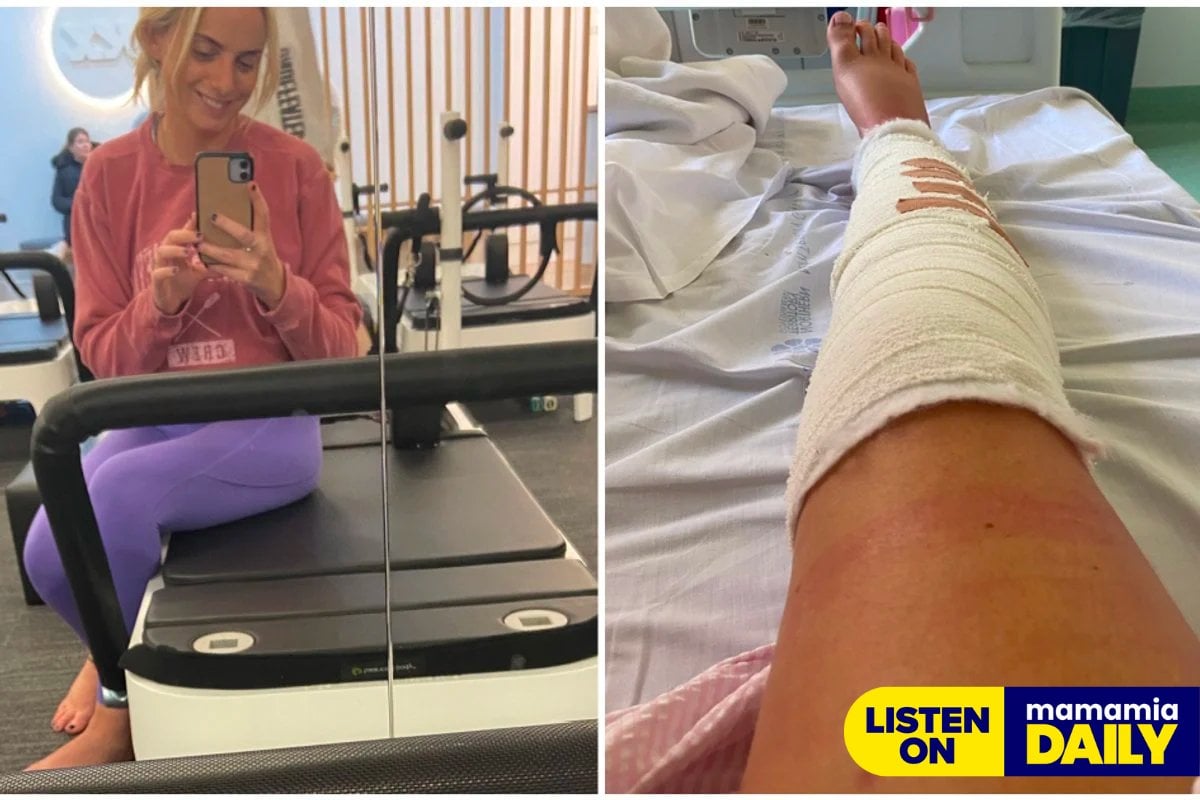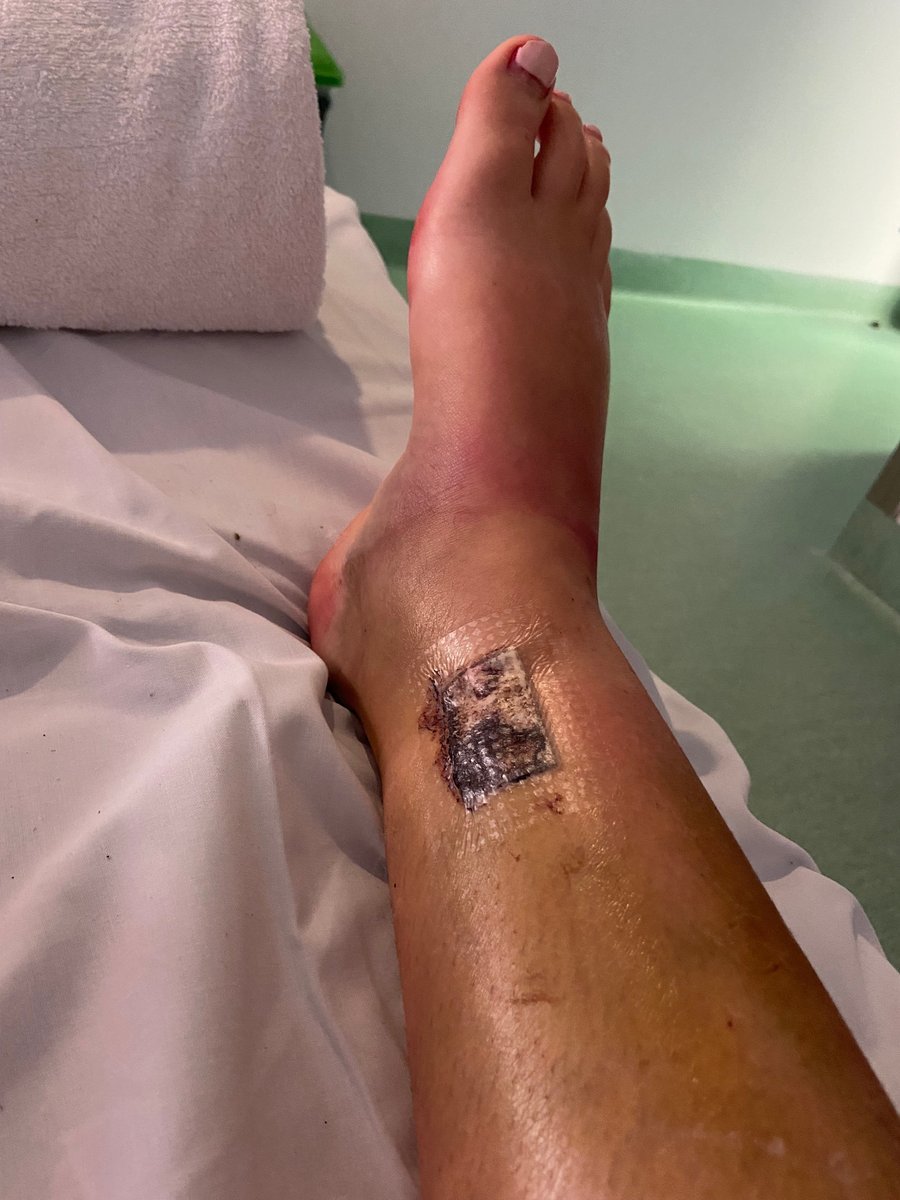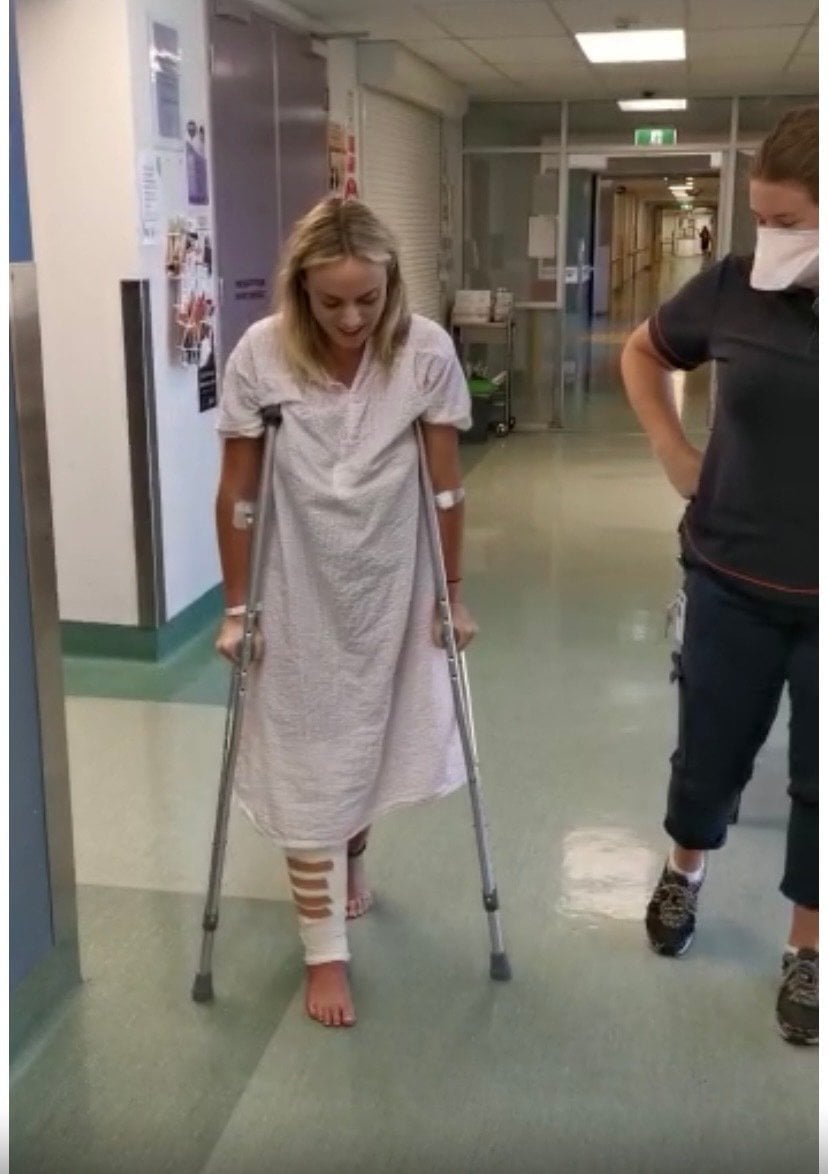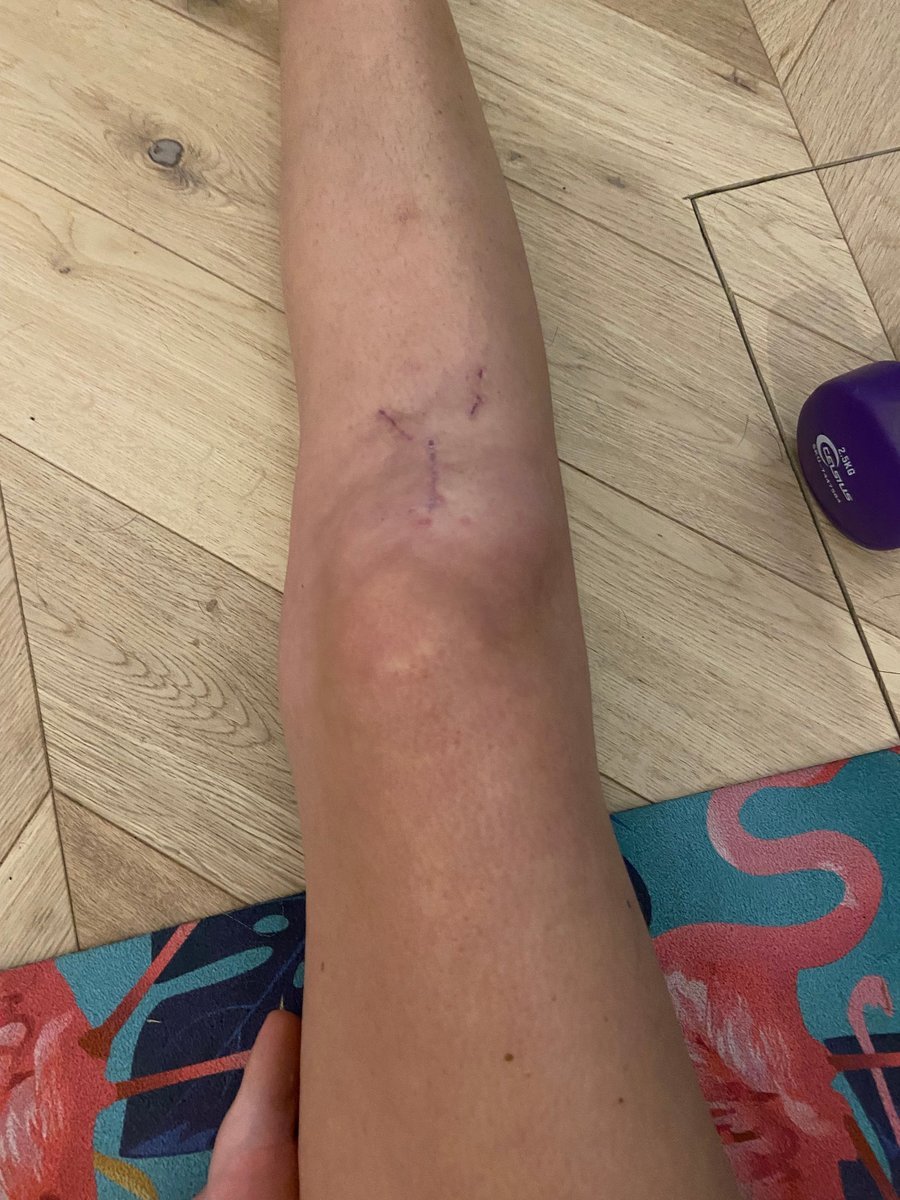
Listen to this story being read by Jessie Stephens, here.
Three and a half months on and I can still hear the snap.
I must have heard it a fraction of a second before I felt it; hot, sharp, violent pain down my right leg.
I yelled that it was broken because when you break a bone you are sure.
It was as though my leg had gone from solid to a piece of wet spaghetti. When I heard the snap, it buckled from under me. I grabbed instinctively at my shin, feeling like I was holding two loose pieces of string together.
I was hiking a canyon, hundreds of metres from the ground below. In the dessert. Just before midday. And it was probably 35 degrees. I knew this wasn't going to be like breaking a bone on a sporting field, a green whistle waiting by the sideline.
For a moment I waited to faint, the pain so severe I was sure my body would just shut down. But the dizziness passed, and I was left with a sensation so consuming I'm not sure I'll ever find the words, which is a lazy thing for a writer to say.
It was, I'd later find out, a comminuted fractured tibia, which means that my shin bone had broken in at least two places. As I'd taken a step, I'd rolled my left ankle and used my right leg to awkwardly correct the fall. In the process, the bottom half of my shin had gone one way, and the top half another, snapping it. I think I could feel the misplaced parts of my tibia hitting against my fibula, the smaller bone on the outside. Many people manage to break both at once, so I was relatively lucky to have my fibula still intact.
For probably an hour and a half, I waited for the rangers, cared for by the incredible people I was hiking with. We could see a visible deformity in the shin. We had an ice pack and some panadol, which, as you might imagine, did not take the edge off the pain in the slightest. With every minute that passed, I kept thinking the pain cannot stay like this. I surely cannot withstand another second. And then, another minute passed.
I knew at the time that what was happening was traumatic. Psychologically, I was coming to terms with the reality that I was in deep, unmanageable pain and no one could help me. There was no one to make it better. I'd always imagined that if things went very wrong, I'd be looked after.
Eventually the rangers arrived, but due to a series of unfortunate events, they did not have access to pain relief.
In order to get me down the canyon on a stretcher, they would need to perform traction, where the two ends of the bone are pulled away from each other and fastened, so you no longer get 'crepitus'. Basically, every time I was moved I could hear and feel the bones grinding on each other, and the agony was so intense I'd scream.
One ranger suggested I bite down on something and another held my hand, while a third pulled the two bones in such a way that it felt like my leg was fracturing one hundred times over.
I thought the initial snap, and the hour and a half of waiting, was 10 out of 10 pain. But compared to traction, it rated barely a three. Something happened to my body in those moments, but something also happened to my soul - whatever that is. For the next hour and a half, as I was stretchered down the canyon, my mind went some place else. I was doing everything in my power to disassociate from my body, to cut myself off from it. What I didn't expect was to feel was such loathing and anger towards my own body that had let me down.
When I finally arrived at the base of the canyon, it became clear that there was no pain relief in the town, either. A nurse shortage, as well as a new policy, meant particular drugs could not be administered. I kept thinking this was a nightmare, but hours had passed and I could not wake up.
 My ankle a few days post surgery. Image supplied.
My ankle a few days post surgery. Image supplied.
In the end, it was eight hours between breaking my leg and receiving pain relief. My mind went to the darkest of places. I think I'd tricked myself into believing that nothing very painful had ever happened to me, because the universe knew I wasn't strong enough to endure it. I've never had a high pain threshold. What a fallacy that was. The universe did not care what I could handle, and I had no choice but to sit and wait. I did not feel strong. I did not feel brave. I felt defeated, but with no way out. I have never felt so trapped.
I thought once I was met by the Royal Flying Doctor's Service, then the pain would be over. I don't know what I would have done if I'd been given a glimpse into the next few hours, then days, then weeks, then months.
Being stretchered in and out of the plane hurt. The X-ray hurt. More traction hurt. The temporary cast hurt. The nerve blocker hurt. The pain after I had a tibial nail inserted through the bone, and fastened with screws in my ankle and knee, hurt. Trying to sleep hurt and going through the airport, finally able to go home, hurt. Physiotherapy hurt. I could not believe how much it all hurt.
 In hospital, learning to use crutches. Image supplied.
In hospital, learning to use crutches. Image supplied.
I started physio one week after surgery, when my ankle and knee were swollen and blue. I couldn't move my foot, and bearing any weight felt impossible. During my first appointment, the physio tapped my forehead and said this would be the biggest hurdle to recovery. Not my body, which knew what to do. My head. I was traumatised, resentful of my injury and defeated.
For years I've done mat and reformer Pilates. When I told him I'd like to eventually get back there, he simply said: "You will. Sooner than you think. And you'll be better at it because of the physio you're about to do."
I couldn't see how losing an enormous amount of muscle would improve my Pilates, and didn't know how to tell him that there was no way I would ever lunge or squat or jump again. My brain would never let me. I couldn't trust my legs. I'd annexed my right leg from the rest of me, pulling it around as a hindrance, viewing it as a kind of punishment.
Before I broke my leg, I had a complicated relationship with exercise. It was, in a way, penance. Self-flagellation. My self talk ranged from "Why can't you hold this plank for another thirty seconds why are you so weak," to, "You might be on the Reformer today, but it's the first time in a week, you should have done this yesterday and the day before... then you'd be able to hold that plank for longer". I pushed myself to uncomfortable limits. I was never doing enough, and I'd shake my head at my arms that couldn't do another rep, or my quads that were shaking. Exercise was a battle between my mind and my body.
My physio could see this the first time he asked me to do an exercise. He would tap my head, telling me to get out of there. He'd see me grimace and ask what I was thinking and I'd say, "I'm angry. I'm angry I can't do it."
I'd ask him how many repetitions of an exercise he wanted me to do and he would say "as many as you can". I didn't understand. I'd want to shout: "LIKE TEN OR ONE HUNDRED?" But there was a lesson buried in there. Trust your body. It will tell you when it's had enough.
Slowly, something changed.
 The scar on my knee, where the nail was inserted. Image supplied.
The scar on my knee, where the nail was inserted. Image supplied.
Certain exercises began to feel good. Really good. I'd speak to my leg, like he'd taught me to, and encouraged and congratulated it. I could not believe that this leg, that only weeks before had been split in half, could now bear weight. Then it could lift itself up on its tippy toes. Then squat. I had to relearn how to walk, how my foot was meant to feel on the ground, and what muscles instinctively switched on.
Some days I would start my exercises and feel uncomfortable pain. So I'd stop. The next, I'd feel ready, and relished in the sensation of a burning muscle, becoming stronger with each movement, excited to have a job to do.
Seven weeks later, I walked (or rather, stumbled forward) for the first time. I cried. It represented freedom and independence. My body had done something I had never thought it was capable of.
What no one tells you about injury or surgery or rehabilitation is how certain you become that you will never, ever get better. I'd have bet all my money on it. When your body has become a home to primarily pain, you stop living inside of it. My physio would massage my leg and remind me that this leg was mine and I could accept it again. Three months down the track, I noticed it wasn't hurting anymore.
Between physio, walking and Pilates, my relationship with exercise has been transformed. I now consider it a privilege. As obvious as it might sound, I'm trying to focus on what feels good. That's it.
I am not, and will never be, an athlete. I don't need to do a triathlon or be the strongest in a class. What is forgotten in a culture that has co-opted exercise to be almost entirely about weight loss is that exercise is meant to feel good. Our bodies ache for it. We've just stopped listening to them.
After enduring the most painful experience I'll (hopefully) ever have, I've developed a sense of both compassion and awe towards my body. I'm able to focus on what it can do, not what it can't.
I'm probably still weaker than I've ever been, still working up my cardiovascular fitness after being unable to walk for six weeks, but I'm enjoying exercise in a way I never thought possible.
I know what pain is now. And exercise? That's not pain.
Exercise is pleasure.
Love to travel? Take this short survey now to go in the running to win a $50 gift voucher!
